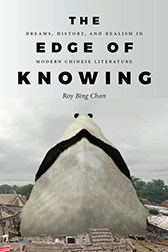Roy Bing Chan’s new book explores twentieth-century Chinese literature that emphasizes sleeping and dreaming as a way to reckon with the trauma of modernity, from the early May Fourth period through the end of the Cultural Revolution in the late 1970s. Informed by theoretical engagements with Russian Formalism, semiotics, psychoanalysis, Marxism, affect studies, and more, The Edge of Knowing: Dreams, History, and Realism in Modern Chinese Literature (University of Washington Press, 2017) considers how time was transformed with the rise of capitalist modernity, and illustrates the significance of a language of dreams and dreaming as writers sought to cope with this transformation and its consequences. We talked about it for the New Books in East Asia podcast and you can listen to our conversation by clicking here.
